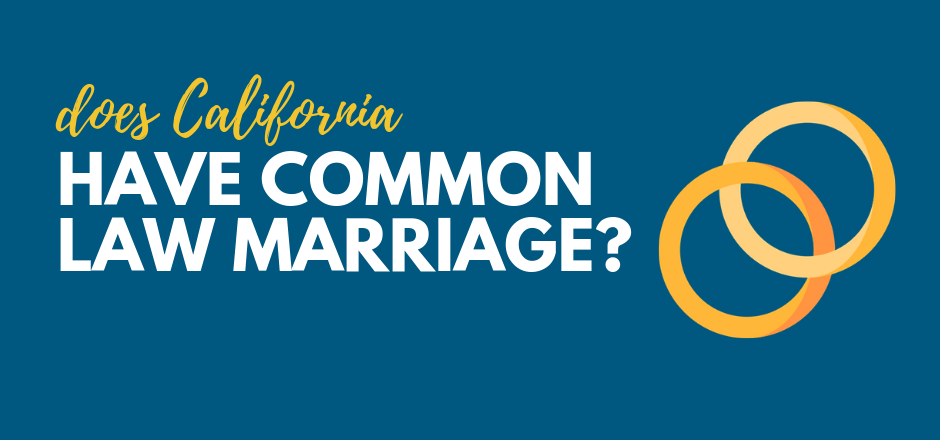Does California Have Common Law Marriage?
If you’ve been living with the same person for an extended period of time, you may have a few questions. Does California have common law marriage? When is it recognized? Can you end a common law marriage?
In this article, we’ll take a close look at California common law marriage.

Does California Have Common Law Marriage?
There is a common myth that any couple that lives together for seven or ten years and considers themselves married can be treated with the same rights and responsibilities as those who had a formal, legal ceremony. While there are a few states that recognize common law marriages, most do not.
California is among the latter.
Common law marriages are not traditional in any sense. Generally speaking, a couple that has cohabitated for seven to ten years, acts married, and represents themselves as married, could be considered common law.
California abolished common law marriage in 1895.
Related: Learn more about family law
What is Interjurisdictional Recognition?
There are 40 states remaining. Thirteen never allowed for common law marriage. The other 27 did at some point, but abolished the practice; some did so as far back as the 1600s. All states recognize common law marriages that were established in other states because they don’t differentiate “foreign” marriages between states.
This means that while you can’t establish a common law marriage while living in the state of California, your marriage is considered intact if you move to California from one of the jurisdictions listed above, as long as it was established legally.
The question of legality does complicate the question a little bit. Interjurisdictional recognition means that if a marriage is legal in the state in which it is performed, it must be considered legal in the state the couple moves to later on. This applies whether the marriage is formally ordained or common law.
For example, first cousins are allowed to get married in California, but they are not allowed to get married in New Jersey. If a couple lies about their family history and marries anyway in New Jersey, the marriage is not legal in either New Jersey or California. If they get married in California and then move to New Jersey, the marriage is considered legal in both places.
How to Prove a Common Law Marriage
This is where things get tricky. Couples married by common law don’t have marriage certificates, court documents, or any other sort of public record that legally proves their union. This is especially important if you are questioned in another state, need to appear in probate court, or want to get a divorce.
Couples can prove they took part in a common law marriage by showing:
- A custom-created agreement witnessed by a third-party
- Joint tax returns
- Joint bank account records
- Documents proving joint ownership of property
- Legal documents, like wills, naming the other party as husband or wife
- Affidavits from family or friends attesting to the fact that the couple held themselves to the public as married
Exactly what you will need to prove you were married may vary from state to state. The state of California has its own special requirements.
How to Handle A Common Law Divorce in California
Yes. Even though common law marriages are not considered a “normal” way to get married, they are still lawful if established in states that allow them. This is where things get a little bit tricky. Common law marriage was established by colonial “common law,” and was then abolished in many states. Divorces have only ever existed as statutory law. This means that any married couple that wants to divorce must adhere to their state’s laws in order to do so.
Related: Learn more about divorce and family law
Living Together in California
The fact that common law marriage doesn’t exist in California doesn’t mean couples who choose not to marry can’t live together. Problems tend to occur, however, when unmarried couples co-mingle their assets, have joint bank accounts, and share debts. In these situations, it’s still important for both parties to create some sort of cohabitation agreement that protects each if they should decide to separate and split their assets. While oral agreements can be made, it’s always safer to have a formal, written agreement on file.
It’s also important for unmarried couples, especially those who have been together for a long time, to consider careful estate planning. They should also establish power of attorney documents in the event one becomes ill and needs the other to make medical or financial decisions. Properly formed wills, estate plans, and other legal documents will give each party the legal rights they need to protect themselves and maintain their property if the other suddenly passes away.
Conclusion
At the end of the day, it’s technically possible for common law marriages to exist in California. They simply can’t have originated within the state and couples need to make sure they have some sort of documentation to prove the establishment of their intended marriage. This can be more difficult if a couple chooses to move from one state to the other, so it’s helpful to ask for affidavits from those who were witnesses before moving around.
Contact a California family law attorney if you have questions about your common law marriage formed in another state, or if you are unmarried but are cohabitating with a significant other. A specialist familiar with California law can help you to put together the documents you need to prove your relationship or protect yourself in the event of an emergency or death.
Are you in search for a certified attorney to represent you?
Let us help you find one today!
